|
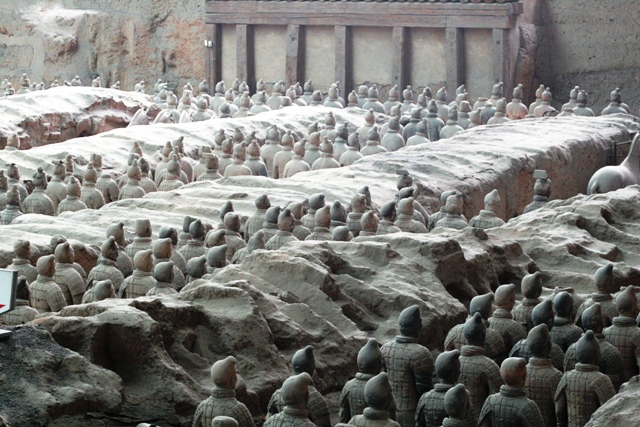 General Douglas MacArthur said, "Old
soldiers never die; they just fade away." Never was this statement
truer than with Emperor Qin Shi Huang, who reigned from
221-206 BC. It was Qin (pronounced Chin) that first unified China
nearly 2200 years ago and gave the country its name. He was a most
harsh and unforgiving emperor who loved monumental building
projects. The two most notable were the Great Wall and his
mausoleum along with the thousands of terra cotta warriors
protecting his temporal remains. These silent sentinels stand about
a mile east of his mausoleum protecting it from invasion. Qin had a
high estimation of what he was going to accomplish in his reign. As
a consequence, he started building his massive mausoleum after his
first year as emperor. It took approximately 30-years and 700,000
slave laborers to construct both his final resting space and the
legions of terra cotta warriors.
General Douglas MacArthur said, "Old
soldiers never die; they just fade away." Never was this statement
truer than with Emperor Qin Shi Huang, who reigned from
221-206 BC. It was Qin (pronounced Chin) that first unified China
nearly 2200 years ago and gave the country its name. He was a most
harsh and unforgiving emperor who loved monumental building
projects. The two most notable were the Great Wall and his
mausoleum along with the thousands of terra cotta warriors
protecting his temporal remains. These silent sentinels stand about
a mile east of his mausoleum protecting it from invasion. Qin had a
high estimation of what he was going to accomplish in his reign. As
a consequence, he started building his massive mausoleum after his
first year as emperor. It took approximately 30-years and 700,000
slave laborers to construct both his final resting space and the
legions of terra cotta warriors.
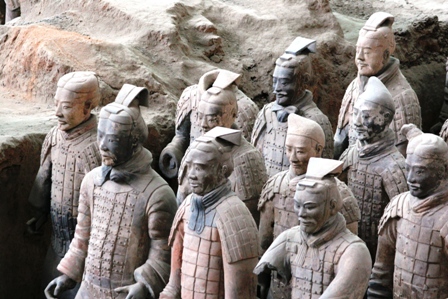
Emperor Qin lined up his army in battle array in three underground
pits covering 18,000 square yards. Chinese authorities estimate
that he had approximately 8,000 life-size terra cotta warriors and
horses made. Each of the warriors stood six-foot tall and revealed
distinct features as to military rank and even facial features. In
addition, they were hand-painted and carried metal weapons. Only
2,000 sculptures have been unearthed and slightly more than half are
still on display.
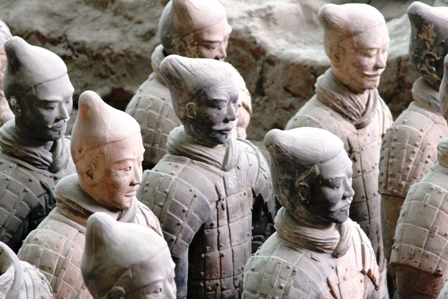
Once Qin's army was ready to protect him for eternity, he encased
the entire security force under a wooden roof that was then covered
it with dirt. For nearly two millennia, time forgot Qin's terra
cotta army. In 1974, two farmers, who were digging for a well,
accidentally came across the terra cotta warriors.
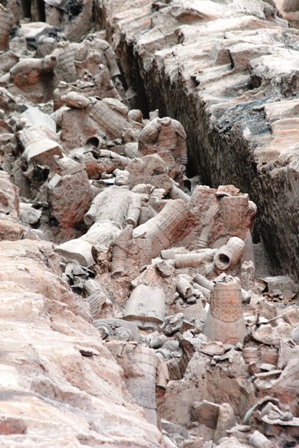 Those 2000 years of embalmment were not easy on Qin's army. The
ceiling collapsed in many places and earthquakes caused extensive
damage to the terra cotta sculptures. However, once the army saw
the light of day or rather the pollution of the air, the statues
that were still in one piece started to change color and began
falling apart due to the ubiquitous Chinese pollution. The
pollution starts an oxidizing process that not only turns the terra
cotta to a gray color but also weakens the clay. Recently, in the
South China Morning Post, Cao Junji, an environmental specialist
from the Chinese Academy of Sciences, said, "If nothing is done now,
in one hundred years the warriors may have corroded to such an
extent that the pits will look like a coal mine and not have any
aesthetic value."
Those 2000 years of embalmment were not easy on Qin's army. The
ceiling collapsed in many places and earthquakes caused extensive
damage to the terra cotta sculptures. However, once the army saw
the light of day or rather the pollution of the air, the statues
that were still in one piece started to change color and began
falling apart due to the ubiquitous Chinese pollution. The
pollution starts an oxidizing process that not only turns the terra
cotta to a gray color but also weakens the clay. Recently, in the
South China Morning Post, Cao Junji, an environmental specialist
from the Chinese Academy of Sciences, said, "If nothing is done now,
in one hundred years the warriors may have corroded to such an
extent that the pits will look like a coal mine and not have any
aesthetic value."
Prior to the peasants accidentally discovering the army in 1974,
General Douglas MacArthur told a joint session of Congress, "All
soldiers never die; they just fade away." MacArthur, a
self-appointed American emperor, could have told his Chinese
counterpart not to waste his time. MacArthur knew something about
the demise of great warriors. Qin's terra cotta army
would face the same fate and slowly just fade away due to the rages
of time.
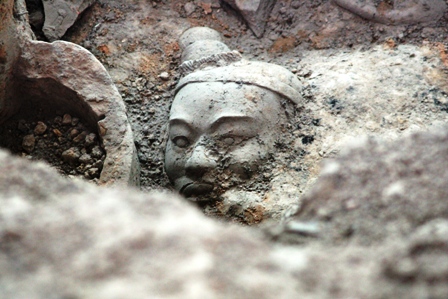
Actually, MacArthur's admonition
is instructive to all of us-not just to Emperor
Qin Shi Huang. Army or not, we are all slowly fading
away. The ravages of time will surely catch-up with us all sooner
or later. Whether we are terra cotta or human, we will all fade
away.
Even today, the Chinese authorities
desperately try to stop time's destructive march. The archeologists
have set up MASH-like field hospitals to care for Qin's wounded
warriors. Painstakingly, they attempt to put all the pieces
together-one shard and potshards at a time. Visitors experience the
surreal attempt at reconstruction of Qin's smashed sentinels.
Nevertheless, if two millennia haven't beaten down Qin's legions,
air pollution will.
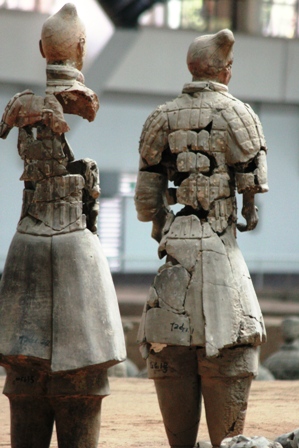
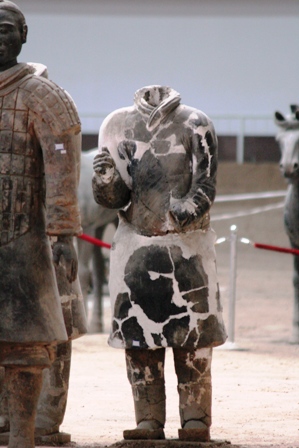
MacArthur was correct: "Old soldiers
never die; they just fade away.
|






